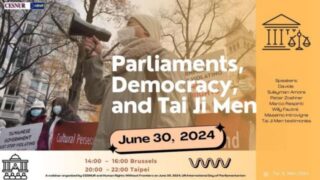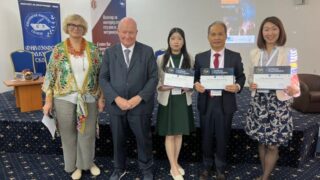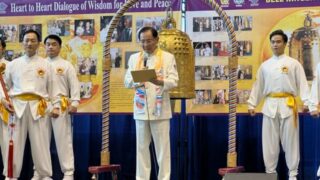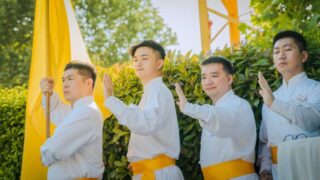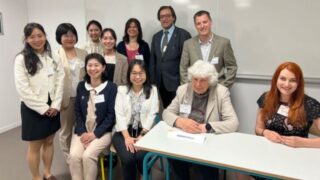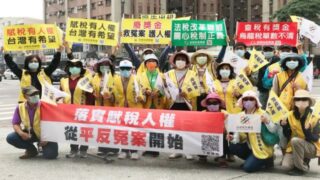The Tai Ji Men case was discussed on UN International Day Commemorating the Victims of Acts of Violence Based on Religion or Belief.
by Daniela Bovolenta


August 22, 2023, was the United Nations International Day Commemorating the Victims of Acts of Violence Based on Religion or Belief. CESNUR and Human Rights Without Frontiers co-organized one of their bi-monthly webinars on the Tai Ji Men case, with the title “Tai Ji Men: Victims No More.”
Alessandro Amicarelli, a London-based attorney and the president of the European Federation for Freedom of Belief (FOB), introduced the webinar. He emphasized the importance of freedom of religion or belief (FoRB) as the cornerstone of all human rights and of the United Nations resolution of 2019 introducing the day of observance of August 22, which follows the one of August 21, commemorating the victims of terrorism.
Amicarelli presented the first video, with a message from the Shifu (Grand Master) of Tai Ji Men, Dr. Hong Tao-Tze. Freedom of religion or belief (FoRB) is clearly enshrined in international law, Dr. Hong said, yet its violations are growing. He mentioned the Tai Ji Men case as an egregious example of these violations. Dr. Hong called on all states to effectively protect FoRB, considering also that religion and belief help suffering human beings by leading human hearts and their desires to be guided by the innate compass of conscience.
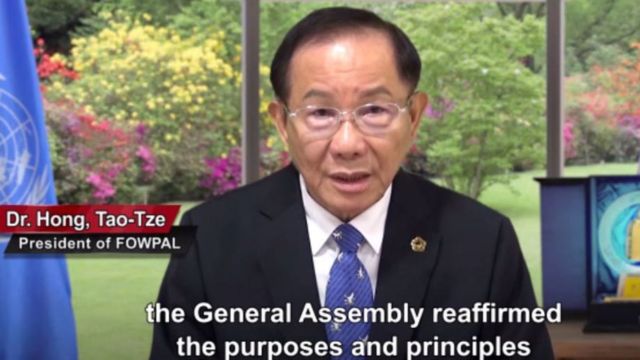

Amicarelli then introduced the speakers of the first session: María Vardé, a graduate in Anthropological Sciences at the University of Buenos Aires, and Massimo Introvigne, an Italian sociologist who serves as editor-in-chief of “Bitter Winter.”
Vardé compared the Tai Ji Men case in Taiwan with a number of recent controversial cases targeting new religious and spiritual movements in her own country, Argentina. In Taiwan Prosecutor Hou Kuan-Jen started the Tai Ji Men case in 1996 by fabricating false accusations and victims, spreading media slander, and detaining Dr. Hong, his wife and two dizi (disciples), who were later found innocent of all charges. In Argentina, special prosecutors of an agency called PROTEX should pursue the worthy goal of fighting human trafficking but in fact use anti-trafficking laws to claim that members and volunteers of groups slandered as “cults” are “trafficked” by “brainwashing” them and making them work for free or even accept sexual abuse (even when the alleged “victims” deny that this was the case). In both cases, Vardé concluded, publicity-hungry prosecutors, who are unfortunately not punished by higher authorities but are even promoted, misuse laws and try to destroy spiritual minorities whose real sin is to think independently.
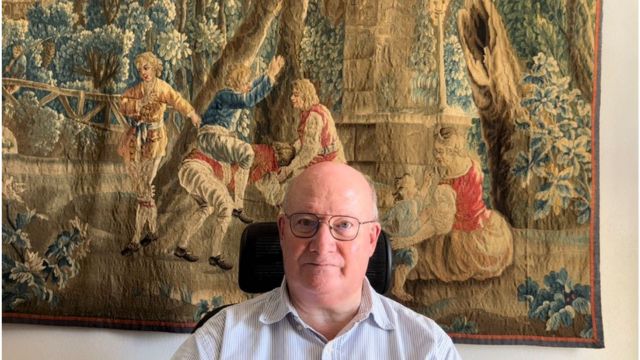

Introvigne reported that when the word “persecution” is used for the Tai Ji Men case even defenders of FoRB claim that calling the Shifu and dizi “persecuted” is exaggerated. “Persecution,” they object, only occurs when religionists are physically armed and blood flows. Introvigne explained that scholars follow two definitions of religious persecution. The oldest one in fact limits it to physical violence but the latter includes unjust detention, a feature of the Tai Ji Men case in 1996 and 1997, when Dr. Hong was also mistreated in the detention center. However, a more recent definition distinguishes between persecution by totalitarian regimes, which mostly happens through physical violence, and by democratic states, who have subtler ways of persecution through administrative harassment. According to this second and more state-of-the-art definition, Tai Ji Men were not persecuted only at the beginning of their case but continue to be persecuted today, Introvigne concluded.
Marco Respinti, an Italian scholar and the director-in-charge of “Bitter Winter,” chaired the second session of the webinar. He reminded the audience that religious persecution is a permanent feature of human history and should be carefully studied to understand its different causes and introduced two videos. The first offered an opportunity to those who were there and those who were not to taste again the spirit of the grand celebrations of July 2023 in Taiwan for the 80th birthday of Dr. Hong. They were much more than a birthday party and led all participants to reflect on love, peace, and conscience as taught for several decades by Tai Ji Men’s Shifu. The second featured the acclaimed participation of Tai Ji Men in the August 13 Parade of Faiths in Chicago, which preceded the 2023 Parliament of World’s Religion.
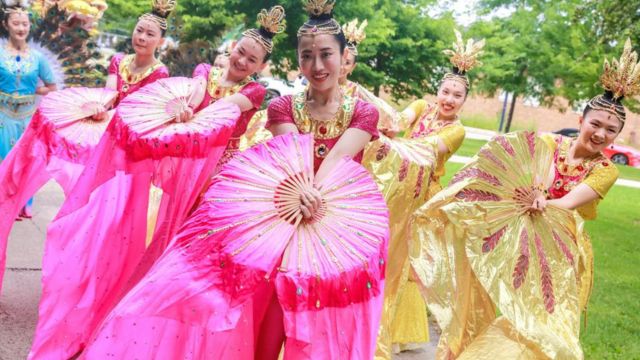

Respinti commented that even in the middle of persecution dizi always bring peace and joy to those they meet. He then introduced five dizi who offered their testimonies. Marshall Huang, an engineer, reported how practicing Qigong cured him of his nervousness, which had led to insecurity and different incidents. For instance, while serving in the military, Huang was so nervous about a possible invasion from Mainland China that one night he opened fire against shadows, causing concern in the other soldiers who believed he might have committed suicide. He became a different person after he joined Tai Ji Men, Huang reported, which makes even more paradoxical the fact that such a publicly beneficial movement continues to be among the victims of persecution based on religion or belief.


Tiffany Wu, a graduate student who also participates in service clubs and organizes camps for low-income primary school students, shared her experience with “difficult” children who, when approached with love and patience, may become very good in expressing themselves. She credited her learning the difficult art of helping others, including children, to the teachings of Dr. Hong and Tai Ji Men. She joined other witnesses in noting the contradiction between the benefits Tai Ji Men has offered to Taiwan and how Prosecutor Hou and others mistreated both Shifu and dizi. Wu also mentioned the ridiculous statement by Hou that Dr. Hong “raised goblins,” and the fact that the prosecutor offered as evidence that he had seen “a hint of a shadow” in the eyes of Tai Ji Men’s Shifu.


Gary Lin, a customer service specialist, noted that persecution of religious minorities by majorities is a constant feature of history. The Roman Empire persecuted the Christians; when they came to power, Christians were in turn not always tolerant of other faiths. The Tai Ji Men case demonstrates, Lin said, that even in democratic states religious persecution is not a thing of the past. Echoing international scholars, Lin expressed concern for how the Tai Ji Men case tarnishes the international image of Taiwan and benefits Taiwan’s enemies. This risk can only be avoided by solving the Tai Ji Men case, he concluded.
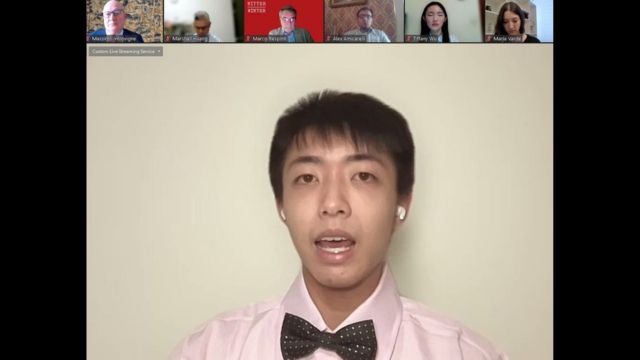

Judy Chu, a junior high school teacher, reported the benefits she obtained from practicing Qigong as taught by Tai Ji Men, at both her personal and professional levels. She focused on the figure of Prosecutor Hou, listing his abuses and violations of law, and noting that rather than being punished, he has been promoted to Deputy Director of the Independent Agency Against Corruption, then Director General of the Institute of Forensic Medicine. This raises doubts on the seriousness of the Taiwanese government’s claims that it wants to eradicate bureaucratic abuse and guarantee transitional justice to the victims of past human rights abuses, Chu said.


Peter C.H. Pan, a sales manager, reported that he joined Tai Ji Men believing that qigong would just improve his physical health, but soon realized that as taught by Dr. Hong it also includes a deep heart cultivation. Pan, like many other dizi, had to face a difficult period when the Tai Ji Men case started and even his own father was misled by media slander. Thanks to the teachings he had received from Dr. Hong, he faced personal and social difficulties with a firm heart, Pan said. Both his professional experience and his work as a volunteer for legal and tax reform led him to discover that the Tai Ji Men case is just part of a systemic issue of dysfunction and unjust functioning of the tax system, Pan concluded.


Willy Fautré, co-founder and director of Human Rights Without Frontiers, offered the conclusions of the webinar. He joined the debate on the concept of “religious persecution” from a human rights perspective. He reported that he started protesting the religious persecution of Christians in Communist countries in the 1970s. At that time, few secular organizations used the expression “religious persecution,” and to some extent this neglect continues even today, as evidenced by a cursory reading of the reports of large human rights watchdogs such as Amnesty International and Human Rights Watch. Even international documents today rarely mention “religious persecution,” while they denounce FoRB violations. While the words used are less important than a sincere commitment to FoRB, Fautré said, abandoning the expression “religious persecution” comes with the risk of diluting the perception of the physical or non-physical violence vested on religious and spiritual groups as a dramatic international problem.
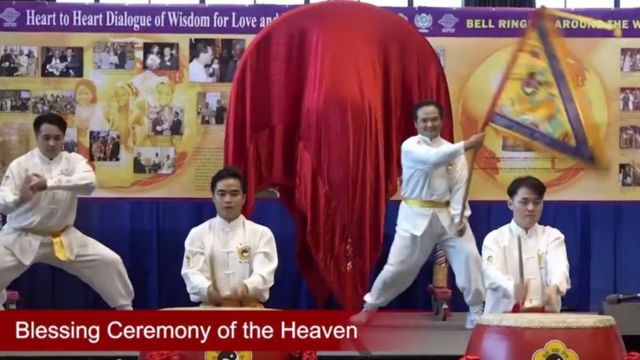

The event concluded with a video about the Global Prayer for Love and Peace offered by Tai Ji Men, with the participation of representatives of several different faiths, at the Parliament of the World’s Religions in Chicago on August 16, 2023, one of the most well-attended events of the whole Parliament.



